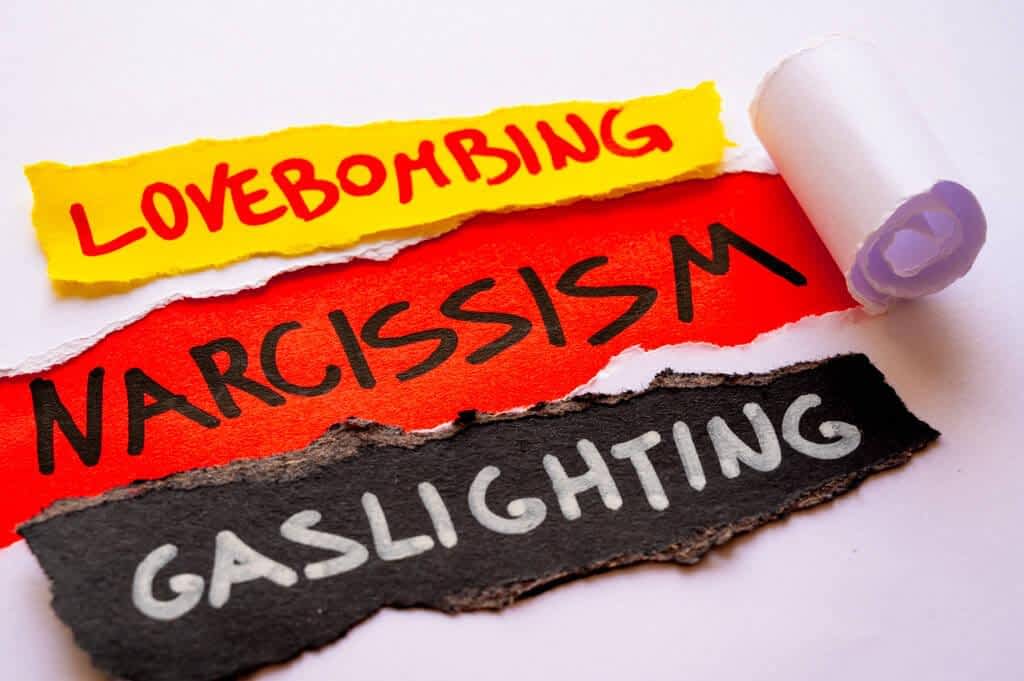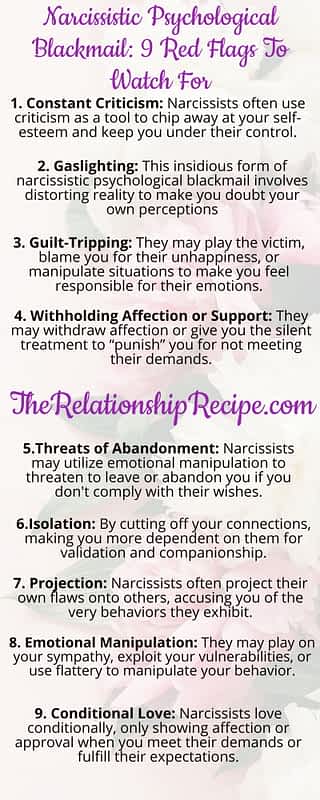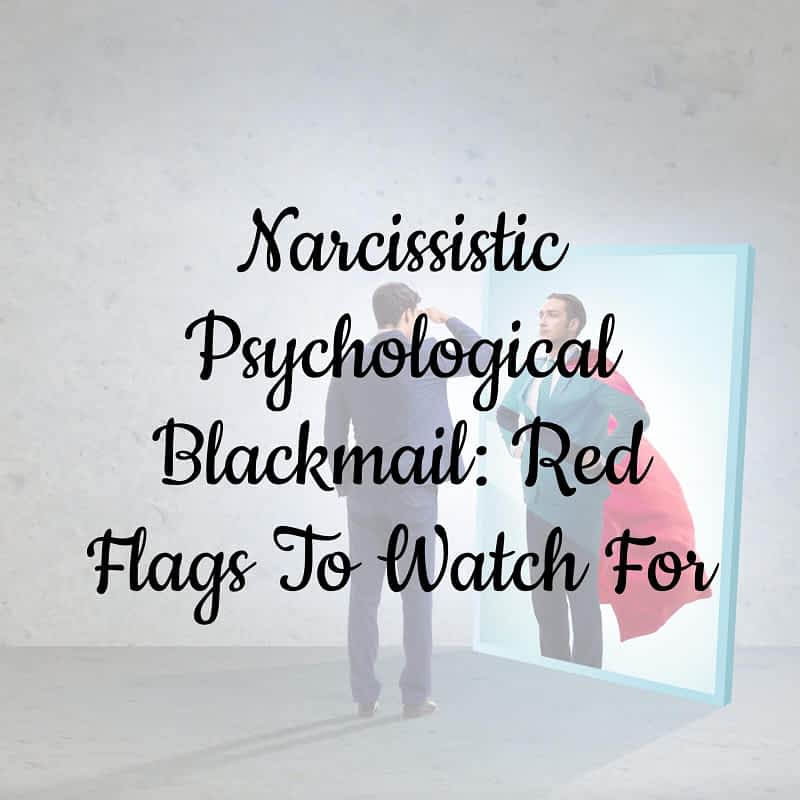Narcissistic Psychological Blackmail: 9 Red Flags To Watch For
If you’ve ever found yourself constantly second-guessing your feelings, walking on eggshells around someone who always seems to twist things in their favor, you’ve likely experienced narcissistic psychological blackmail. It’s a quiet war on your self-worth, disguised as concern or love. Of the many narcissistic abuse tactics, this is one of the most exhausting and confusing forms of emotional manipulation, and it can sneak into your life in ways you never expected.
These are 9 red flags to watch for when you suspect you’re dealing with narcissistic psychological blackmail. I’m also sharing some things that will help you cope along the way, because you deserve emotional safety and peace, not more self-doubt.
💡Key Highlights:
- The subtle threats that keep you trapped without visible chains
- Why their charm isn’t kindness—and what it’s really covering up
- The moment you realize approval isn’t the same as love
- How emotional isolation quietly rewrites your reality
- The difficult steps to break a bond that feels like home but isn’t

9 Examples of Narcissistic Psychological Blackmail
🚩1. Constant Criticism
One of the sneakiest ways narcissists keep control is through constant criticism. It’s not always screaming or insults; it can be those little jabs, the backhanded comments, the way they act like you can never do anything quite right. In narcissistic relationships, this kind of emotional manipulation isn’t helping you grow, it’s tearing you down.
They’ll nitpick everything from how you talk to how you dress, while completely ignoring your accomplishments. Nothing you do is ever “good enough,” and over time, that can make you feel small, emotionally exhausted, and desperate for their approval. That’s the trap. It’s psychological manipulation designed to make you question yourself, so they stay in control.
The truth: their impossible standards are not a reflection of your worth. Not even close. The moment you start recognizing these narcissistic abuse tactics for what they are, you can start untangling yourself from the cycle. That means setting boundaries, leaning on safe people, and gently rebuilding your confidence with real love, starting from within.

🚩2. Gaslighting:
One of the most damaging forms of narcissistic psychological blackmail is gaslighting. This psychological manipulation is designed to make you feel like you’re slowly losing your grip on reality. This isn’t just someone disagreeing with you; it’s a calculated form of emotional manipulation that chips away at your confidence and leaves you feeling off-balance.
Picture this: you’re having a conversation with your partner about something that happened last week. You know what you saw, what was said, and who was there. But as you talk, they start planting little seeds of doubt—“Are you sure that’s how it happened?” “You’re being dramatic again.” “That’s not what I remember at all.”
At first, you brush it off. But then it keeps happening. Again and again. And slowly, you start to question yourself. Maybe you did get it wrong. Maybe you are overreacting. That’s the trap of gaslighting: it’s quiet, it’s gradual, and it’s incredibly disorienting.
Over time, it erodes your sense of reality and leaves you vulnerable to even more narcissistic abuse tactics. You stop trusting your gut. You shrink. But recognizing this pattern is powerful. You’re not “too sensitive.” You’re not “crazy.” You’re being manipulated, and naming it is the first step toward reclaiming your clarity and your truth. Truth holds ZERO value when it comes to narcissistic abuse tactics.

🚩3. Manipulative Guilt-Tripping:
When we talk about narcissistic psychological blackmail, there’s a little acronym that perfectly sums up the emotional mess it creates: FOG—Fear, Obligation, and Guilt. Narcissists are masters at using guilt to keep you stuck. It’s one of their favorite tools for emotional manipulation, and they use it in ways that feel subtle at first, but are completely exhausting over time.
Let’s say you’re excited to make weekend plans with friends. You bring it up to your partner, and they act distant, maybe even a little cold. Then, right before you’re about to leave, their mood completely shifts. Suddenly, they’re quiet, withdrawn… and then come the guilt bombs. “You’re leaving me again?” “I guess I don’t matter.” “Must be nice to be wanted by other people.”
You try to explain. You reassure them. But it doesn’t matter, because it’s not about the plans. It’s the control. This is psychological manipulation designed to make you feel selfish for having a life outside of them.
Before long, you feel guilty for needing space, obligated to fix their mood, and afraid of what might happen if you don’t. That’s the emotional trap. And it’s how narcissists keep you tied to their emotional rollercoaster through narcissistic abuse tactics.
Your need for joy, connection, and independence is not selfish. You’re allowed to have a life that isn’t built around managing someone else’s feelings. Naming these patterns is the first step to reclaiming your peace, and slowly, gently untangling yourself from the FOG.

🚩4. Withholding Affection or Support:
One of the cruelest forms of narcissistic psychological blackmail is when love turns into a weapon. Narcissists know exactly how much you crave connection so they use it as currency. If you don’t do what they want, suddenly the warmth vanishes. It’s not a misunderstanding – it’s emotional manipulation in its rawest form.
Imagine walking through the door after a long, draining day, hoping for just a little comfort; maybe a hug, a kind word, something to remind you you’re not alone. But instead, you’re greeted by silence. No eye contact. No affection. Just a wall of icy detachment.
You rack your brain, wondering what you did wrong. You try to bridge the gap, but you’re met with indifference or a passive-aggressive brush-off. This isn’t just distance; it’s psychological manipulation designed to punish you.
What’s worse is they won’t tell you what you did. You’re left guessing, blaming yourself, desperate to earn back their warmth. That’s exactly the point. The narcissist uses emotional withdrawal as a control tactic, keeping you walking on eggshells, chasing approval that never lasts.
Here’s the hard truth: empathy from a narcissist is conditional, and often only appears when it benefits them. Real love doesn’t disappear when you make a mistake.

🚩5. Threats of Abandonment:
One of the most gut-wrenching tactics in narcissistic psychological blackmail is when they threaten to leave you if you don’t fall in line. It’s not just a dramatic moment – it’s emotional manipulation at its most chilling. These threats aren’t about solving a problem. They’re about control.
Let’s say you’re in a simple disagreement, nothing huge, and out of nowhere comes the bomb: “If you don’t do what I want, I’ll leave.” Just like that, the fear kicks in. Your heart sinks, your mind scrambles, and suddenly, the argument isn’t about the actual issue anymore.
You start pleading, compromising, twisting yourself into emotional knots trying to keep them from walking away. You convince yourself that maybe it is your fault, maybe you’re asking for too much, maybe if you just change this one thing…
No healthy relationship uses the threat of abandonment as leverage. When someone you love uses your fear of being left to control you, that’s not love – it’s psychological manipulation. It plants seeds of insecurity that grow into full-blown self-doubt. Over time, you begin shrinking just to keep the peace, losing little pieces of yourself just to feel “safe.”
This is what’s called a trauma bond; a cycle of fear, guilt, and hope that keeps you tied to someone who’s constantly moving the goalposts. Healthy relationships need stability to thrive, not ultimatums.

🚩6. Isolation
One of the sneakiest forms of narcissistic psychological blackmail is when they slowly, deliberately isolate you from the people who love you. It doesn’t happen overnight, it’s a slow burn, and before you know it, your world starts to shrink.
Let’s say you’re excited to go hang out with friends – people you’ve known forever, who know you. But suddenly, your partner starts making little comments. “Are they really your friends?” “They don’t seem to respect our relationship.” “I just get a bad feeling about them.” At first, it sounds like concern. But it’s not. It’s emotional manipulation.
They plant these tiny doubts, and before long, you’re second-guessing the people who’ve always been in your corner. Maybe they criticize your friends’ choices, or act moody every time you make plans without them. Maybe they even guilt-trip you into staying home, saying you care more about other people than you do about them.
And little by little, you start to pull away from your support system because it just feels easier than dealing with the drama. And that’s exactly what they want. Because once you’re isolated, they’ve got more power. You become more dependent on them for validation, connection, and emotional support.
This isn’t just possessiveness – it’s a full-on narcissistic abuse tactic, and it’s meant to cut you off from any outside perspective that might remind you of who you really are. That’s why recognizing this kind of manipulation matters.

🚩7. Projection
One of the most infuriating and confusing forms of narcissistic psychological blackmail is projection. A narcissist doesn’t just dodge accountability; they straight-up launch their own bad behavior at you and act like you’re the one with the problem.
Let’s say your partner has been staying out late more and more, with no explanation, no heads-up – just ghosting until they walk in the door like nothing happened. When you finally say something (as anyone would), they twist it. Suddenly you’re the one being “paranoid.” You’re the one who’s “too controlling.”
Meanwhile, you’re not accusing – you’re just asking for honesty. But instead of taking responsibility, they flip it. They accuse you of the very things they’re doing: lying, sneaking around, being shady. That’s projection. And it’s not an accident.
This psychological manipulaltion is designed to throw you off balance. You came in with a legitimate concern, and now you’re the one feeling guilty, confused, and on the defensive. That’s how they control you and the narrative, by dodging consequences to protect their ego.
By the time it’s over, you’re second-guessing your own instincts. That’s the trap. If this feels familiar, trust your gut, even when they try to convince you otherwise. You’re not crazy. You’re being manipulated. Seeing that is the first step out.

🚩8. Emotional Manipulation
Narcissists are masters of emotional manipulation, and they’ll use any tactic to get what they want. Sympathy, guilt, and lattery are all fair game if it helps them twist you into compliance.
Picture this: you’re emotionally raw. Maybe you’ve just opened up about something painful: work stress, family issues, past trauma. Instead of offering support, your partner hijacks the moment. Suddenly, they’re the one hurting. They’re the one suffering. Somehow, your pain becomes about them.
They might guilt-trip you with lines like, “You don’t even see what I go through,” or flip the narrative to make themselves the victim. Or, they might go the opposite route by laying it on thick with over-the-top praise and affection, just enough to make you feel seen… right before asking you to do something for them. Flattery, too, becomes a tool for control.
This is narcissistic psychological blackmail in action: manipulating your emotions, especially your compassion, to wear down your boundaries and make you easier to control.
Before long, you’re constantly ignoring your own needs, and living for their approval. That’s not love. That’s emotional exploitation.
If you feel like your feelings are always used against you, you’re not being “too sensitive.” You’re being manipulated.

🚩9. Conditional Love:
With narcissists, love isn’t love – it’s a transaction. You’re rewarded when you obey. Ignored or punished when you don’t. It’s not affection. It’s control dressed up as a relationship.
Let’s say you’ve been grinding away on a project that means everything to you; something that’s taken your time, energy, heart. You’re proud. You want to share it with someone who’s supposed to care. But when you show your partner, they brush it off, nitpick, or act uninterested. No “I’m proud of you,” no genuine support. Just cold detachment or criticism.
Fast forward a few hours: you cancel your plans with friends, just to make them feel better. Suddenly, they’re warm, affectionate, even grateful. Why? Because you gave them what they wanted: compliance.
That warmth you craved isn’t real, it’s a reward for obedience. And the second you do something that doesn’t serve them, it vanishes again.
This kind of conditional love is a manipulation tactic, not a flaw in your worth. It keeps you stuck, scrambling to please them, constantly afraid you’re not “enough.” The truth is, you’re not unlovable, you’re being emotionally blackmailed into thinking you are.
You don’t have to earn love by shrinking yourself. Real love doesn’t come with strings, punishments, or silence.

Coping With Narcissistic Abuse Tactics
Dealing with emotional manipulation from a narcissistic partner or loved one can feel like walking through a storm without an umbrella. It’s exhausting, confusing, and sometimes downright heartbreaking. Here are some practical steps that helped me find my footing when things got tough:
✔️Set Boundaries
This one’s a must-do. It’s okay to say “no” and stand firm, even if the narcissist pushes back or throws a fit. Your boundaries are your armor, so don’t let anyone tear them down.
✔️Reach Out for Support
You don’t have to go through this alone. Talk to friends, family, or a therapist who truly listens and gets it. Having people in your corner makes a world of difference when you’re doubting yourself.
✔️Make Self-Care Non-Negotiable
Do what fills your cup – whether it’s a walk in nature, binge-watching your favorite show, journaling, or meditating. Self-care isn’t selfish; it’s essential for your emotional survival.
✔️Get Informed
Knowledge is power. The more you understand narcissistic behavior and emotional manipulation, the better you’ll be at spotting the tactics and protecting yourself.
✔️Practice Emotional Detachment
Remember, their twisted games reflect their issues, not yours. When you can emotionally step back, their manipulation loses its grip. It’s not about you, no matter how much they try to convince you otherwise.

Healing From Narcissistic Psychological Blackmail
Healing from a narcissistic relationship isn’t a quick fix. It’s a slow, sometimes messy journey that takes time, patience, and a lot of self-reflection. But trust me, it’s possible to reclaim your sense of self and find peace again. Here are some steps that really helped me along the way:
✔️Acknowledge Your Experience
First off, give yourself permission to feel everything—anger, sadness, confusion. Your experience is real, and you’re not alone in this. Validating your feelings is the first big step toward healing.
✔️Be Kind to Yourself
This is where self-compassion comes in. Cut yourself some slack. You’re healing from a deep wound, and that means being gentle with yourself. Remind yourself every day that you deserve love, respect, and happiness—starting with from you.
✔️Drop the Guilt
Guilt is a heavy chain, and it’s not yours to carry. You’re not responsible for their behavior or emotions. Let go of the blame—you deserve to put yourself first without feeling bad about it.
✔️Grow Through It
Pain sucks, but it can also be a powerful teacher. Use this time to invest in yourself—your confidence, your passions, your sense of who you truly are. Healing can open the door to a stronger, wiser you.
✔️Get Help When You Need It
There’s zero shame in reaching out for professional support. Therapy or counseling can be a safe space to untangle your emotions, gain fresh perspective, and learn healthy ways to move forward.
Healing isn’t linear. Some days will feel like progress, others like setbacks. But every step you take is a step closer to reclaiming your freedom and happiness.


Thank you for reading this post, don't forget to subscribe!







